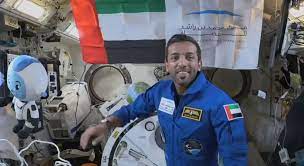UAE astronaut Sultan AlNeyadi, who is now in his third week aboard the International Space Station, is working on a gravity simulator as part of his experiment on space biomanufacturing, the Mohammed in Rashid Space Centre (MBRSC) has tweeted on Wednesday.
“This experiment contributes to the advancement of space biomanufacturing, which includes the production of food and pharmaceuticals,” added MBRSC.
AlNeyadi installed the rhodium science chambers in the variable gravity simulator as part of the Rhodium DARPA Biomanufacturing 01 investigation.
According to Nasa, Efficient and Resilient Biomanufacturing in Variable Gravity (Rhodium DARPA Biomanufacturing 01) is an investigation funded by the US Department of Defence (DoD) and the Defence Advanced Research Projects Agency (DARPA) to determine whether biomanufacturing is feasible in a microgravity environment.
Biomanufacturing is the process of using living systems such as microorganisms and cell cultures to produce materials and biomolecules on a commercial scale.
AlNeyadi’s experiment will help “answer fundamental questions about future space biomanufacturing feasibility by quantifying current biomanufacturing performance in space.”
“In theory, space biomanufacturing can substantially reduce mission costs,” Nasa noted, adding: “The practical viability of space biomanufacturing, however, is an open pro
Khaleej Times



